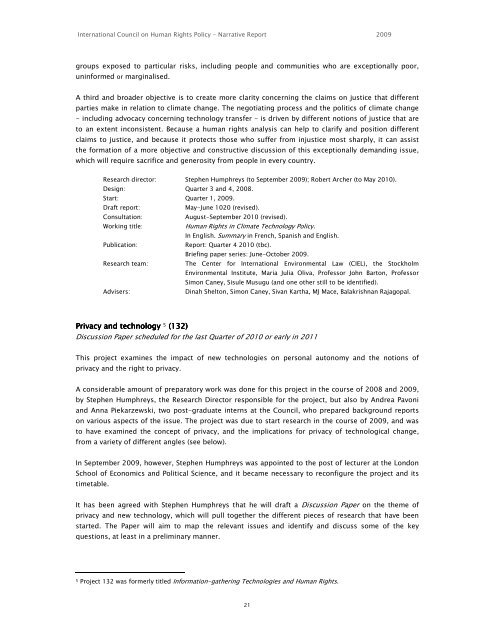NARRATIVE REPORT 2009 - The ICHRP
NARRATIVE REPORT 2009 - The ICHRP
NARRATIVE REPORT 2009 - The ICHRP
You also want an ePaper? Increase the reach of your titles
YUMPU automatically turns print PDFs into web optimized ePapers that Google loves.
International Council on Human Rights Policy - Narrative Report <strong>2009</strong><br />
groups exposed to particular risks, including people and communities who are exceptionally poor,<br />
uninformed or marginalised.<br />
A third and broader objective is to create more clarity concerning the claims on justice that different<br />
parties make in relation to climate change. <strong>The</strong> negotiating process and the politics of climate change<br />
- including advocacy concerning technology transfer - is driven by different notions of justice that are<br />
to an extent inconsistent. Because a human rights analysis can help to clarify and position different<br />
claims to justice, and because it protects those who suffer from injustice most sharply, it can assist<br />
the formation of a more objective and constructive discussion of this exceptionally demanding issue,<br />
which will require sacrifice and generosity from people in every country.<br />
Research director: Stephen Humphreys (to September <strong>2009</strong>); Robert Archer (to May 2010).<br />
Design: Quarter 3 and 4, 2008.<br />
Start: Quarter 1, <strong>2009</strong>.<br />
Draft report:<br />
May-June 1020 (revised).<br />
Consultation:<br />
August-September 2010 (revised).<br />
Working title:<br />
Human Rights in Climate Technology Policy.<br />
In English. Summary in French, Spanish and English.<br />
Publication:<br />
Report: Quarter 4 2010 (tbc).<br />
Briefing paper series: June-October <strong>2009</strong>.<br />
Research team:<br />
<strong>The</strong> Center for International Environmental Law (CIEL), the Stockholm<br />
Environmental Institute, Maria Julia Oliva, Professor John Barton, Professor<br />
Simon Caney, Sisule Musugu (and one other still to be identified).<br />
Advisers:<br />
Dinah Shelton, Simon Caney, Sivan Kartha, MJ Mace, Balakrishnan Rajagopal.<br />
Privacy and technology 5 (132)<br />
Discussion Paper scheduled for the last Quarter of 2010 or early in 2011<br />
This project examines the impact of new technologies on personal autonomy and the notions of<br />
privacy and the right to privacy.<br />
A considerable amount of preparatory work was done for this project in the course of 2008 and <strong>2009</strong>,<br />
by Stephen Humphreys, the Research Director responsible for the project, but also by Andrea Pavoni<br />
and Anna Piekarzewski, two post-graduate interns at the Council, who prepared background reports<br />
on various aspects of the issue. <strong>The</strong> project was due to start research in the course of <strong>2009</strong>, and was<br />
to have examined the concept of privacy, and the implications for privacy of technological change,<br />
from a variety of different angles (see below).<br />
In September <strong>2009</strong>, however, Stephen Humphreys was appointed to the post of lecturer at the London<br />
School of Economics and Political Science, and it became necessary to reconfigure the project and its<br />
timetable.<br />
It has been agreed with Stephen Humphreys that he will draft a Discussion Paper on the theme of<br />
privacy and new technology, which will pull together the different pieces of research that have been<br />
started. <strong>The</strong> Paper will aim to map the relevant issues and identify and discuss some of the key<br />
questions, at least in a preliminary manner.<br />
5<br />
Project 132 was formerly titled Information-gathering Technologies and Human Rights.<br />
21
















